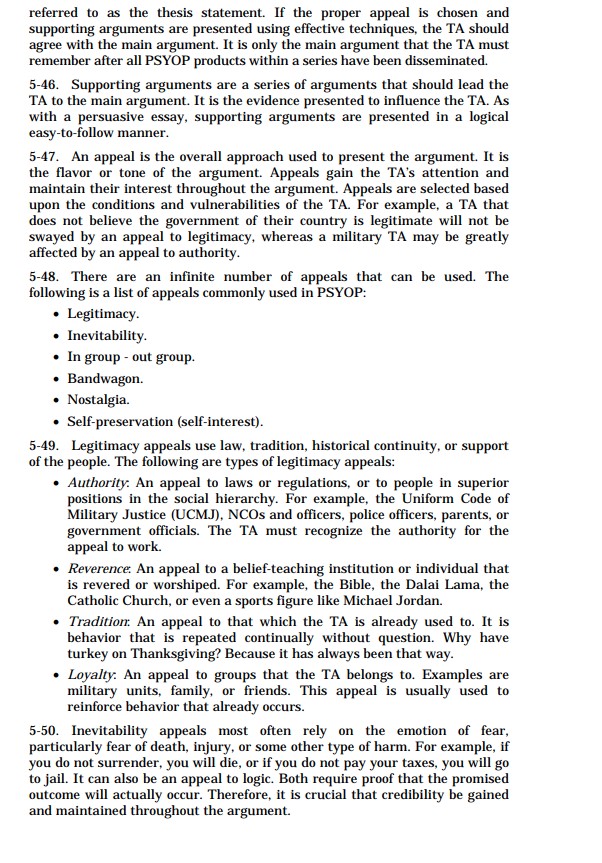Difference between revisions of "2003 U.S. Army Field Manual: Psychological Operations Tactics, Techniques, and Procedures - Lines of persuasion"
From Conservapedia
Conservative (Talk | contribs) |
Conservative (Talk | contribs) |
||
| (7 intermediate revisions by the same user not shown) | |||
| Line 4: | Line 4: | ||
In military conflicts it is often also known as '''PSYOP''', Psy Ops and "winning the hearts and minds". In military and political conflicts it is often referred to as [[propaganda]]. | In military conflicts it is often also known as '''PSYOP''', Psy Ops and "winning the hearts and minds". In military and political conflicts it is often referred to as [[propaganda]]. | ||
| − | + | According to the [[United States Army]]: | |
| + | {{Cquote|Psychological Operations (PSYOP) Soldiers benefit the Army’s missions by using unconventional techniques. Their intelligence, interpersonal skills, cultural sensitivity, and foreign language proficiency help sway opinions and actions of foreign governments, groups, and individuals. Psychological warfare requires adaptability, resilience, and problem solving to be successful. To become a PSYOP Soldier, you’ll be thoroughly tested and trained on your critical thinking skills, and your mental and physical toughness, in order to prepare you for work in the field.<ref>[https://www.goarmy.com/careers-and-jobs/specialty-careers/special-ops/psychological-operations.html PSYCHOLOGICAL OPERATIONS - U.S. Army website]</ref>}} | ||
| − | [[File:US Army 2003 Field Manual of Psysop operations Lines of persuasion.jpg|thumbnail|center| | + | Below is the lines of persuasion section for the 2003 U.S. Army Field Manual for Psychological Operations Tactics, Techniques, and Procedures<ref>[https://irp.fas.org/doddir/army/fm3-05-301.pdf 2003 U.S. Army Field Manual: Psychological Operations Tactics, Techniques, and Procedures - Lines of persuasion]</ref> (The term TA in the document refers to the target audience): |
| − | [[File:US Army 2003 Field Manual of Psysop operations Lines of persuasion 2.jpg|thumbnail|center| | + | |
| − | [[File:US Army 2003 Field Manual of Psysop operations Lines of persuasion 3.jpg|thumbnail|center| | + | [[File:US Army 2003 Field Manual of Psysop operations Lines of persuasion.jpg|thumbnail|center|4000px]] |
| − | [[File:US Army 2003 Field Manual of Psysop operations Lines of persuasion 4.jpg|thumbnail|center| | + | [[File:US Army 2003 Field Manual of Psysop operations Lines of persuasion 2.jpg|thumbnail|center|4000px]] |
| + | [[File:US Army 2003 Field Manual of Psysop operations Lines of persuasion 3.jpg|thumbnail|center|4000px]] | ||
| + | [[File:US Army 2003 Field Manual of Psysop operations Lines of persuasion 4.jpg|thumbnail|center|4000px]] | ||
== See also == | == See also == | ||
Latest revision as of 09:14, January 31, 2023

"The supreme art of war is to subdue the enemy without fighting." - Sun Tzu
In terms of conflicts, psychological warfare (PSYWAR) is used "to denote any action which is practiced mainly by psychological methods with the aim of evoking a planned psychological reaction in other people."[1]
In military conflicts it is often also known as PSYOP, Psy Ops and "winning the hearts and minds". In military and political conflicts it is often referred to as propaganda.
According to the United States Army:
| “ | Psychological Operations (PSYOP) Soldiers benefit the Army’s missions by using unconventional techniques. Their intelligence, interpersonal skills, cultural sensitivity, and foreign language proficiency help sway opinions and actions of foreign governments, groups, and individuals. Psychological warfare requires adaptability, resilience, and problem solving to be successful. To become a PSYOP Soldier, you’ll be thoroughly tested and trained on your critical thinking skills, and your mental and physical toughness, in order to prepare you for work in the field.[2] | ” |
Below is the lines of persuasion section for the 2003 U.S. Army Field Manual for Psychological Operations Tactics, Techniques, and Procedures[3] (The term TA in the document refers to the target audience):
See also
References
- ↑ Szunyogh, Béla (1955). Psychological warfare; an introduction to ideological propaganda and the techniques of psychological warfare. United States: William-Freder
- ↑ PSYCHOLOGICAL OPERATIONS - U.S. Army website
- ↑ 2003 U.S. Army Field Manual: Psychological Operations Tactics, Techniques, and Procedures - Lines of persuasion



